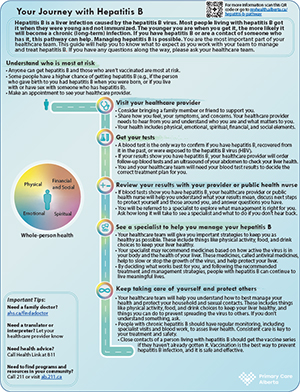If you have chronic (long-term) hepatitis B, your healthcare provider will refer you to a specialist.
Depending on where you live, you may be referred to a hepatologist (liver specialist), infectious disease specialist, or a gastroenterologist (specialist in all organs of the digestive system, which includes the liver).
Your specialist will look at the results from your blood work and have a conversation with you to determine how to best manage your hepatitis B. They will talk with you about whether antiviral medicines are a good option for you. Not everyone with chronic hepatitis B needs antiviral medicines. People with chronic hepatitis B can live long and active lives by
taking good care of themselves and having regular appointments to watch for liver issues. Your treatment recommendations are based on how active the virus is in your body and the health of your liver.
Antiviral medicines
For those who develop chronic hepatitis B, using antiviral medicine may be an option. Antiviral medicines stop or slow the growth of hepatitis B virus and help protect the liver from more serious damage. Your specialist will look at your test results and talk with you to determine if antiviral medicines are a good option.
- Some antiviral medicines, called nucleoside analogs, are pills that are taken once a day, usually for many years.
- Some medicines, called interferons, require injections. Interferons are usually given once per week for 12 months.
Never stop taking your medicine unless your healthcare provider tells you to stop.
In rare cases, antiviral medicines can have severe side effects.
With any treatment for hepatitis B, there is a chance it will come back once you have stopped treatment.
There may be a cost for these medicines. Phone your benefits provider or talk with your doctor to learn what coverage options are available. You may be able to get your medicine covered by your drug plan.
Watching your symptoms is important while taking antiviral medicines. Call your healthcare provider or Health Link at 811 if you have any concerns. You might feel like you don’t want to bother your healthcare team, but no detail is too small to share. If it matters to you, it will matter to your healthcare team.
Travelling
If you are taking medicine for hepatitis B, always pack your medicine in your carry-on bag. This makes sure you can access your medicine if your checked luggage is lost or delayed. Speak with your pharmacist about packing extra medicine in case of travel delays and unexpected situations.
If you are travelling to an area where hepatitis A is common, and you haven’t received the hepatitis A vaccine series, talk to your healthcare team about getting it. The
hepatitis A vaccine series is recommended for people with hepatitis B because having both infections (hepatitis A and B) together can lead to liver failure.
Communication with your healthcare team
Talk with your healthcare team about what follow-up communication to expect. Connect with your healthcare team whenever you:
- have questions
- notice your symptoms getting worse
- have problems with your medicine
- haven’t gotten test results or heard back about an appointment in the time you had agreed to

Hepatitis B Pathway
Download or print the
full patient pathway (PDF) and
summary (one-page PDF) to learn more about how to manage and treat hepatitis B.
Patient Pathway  Summary
Summary 
